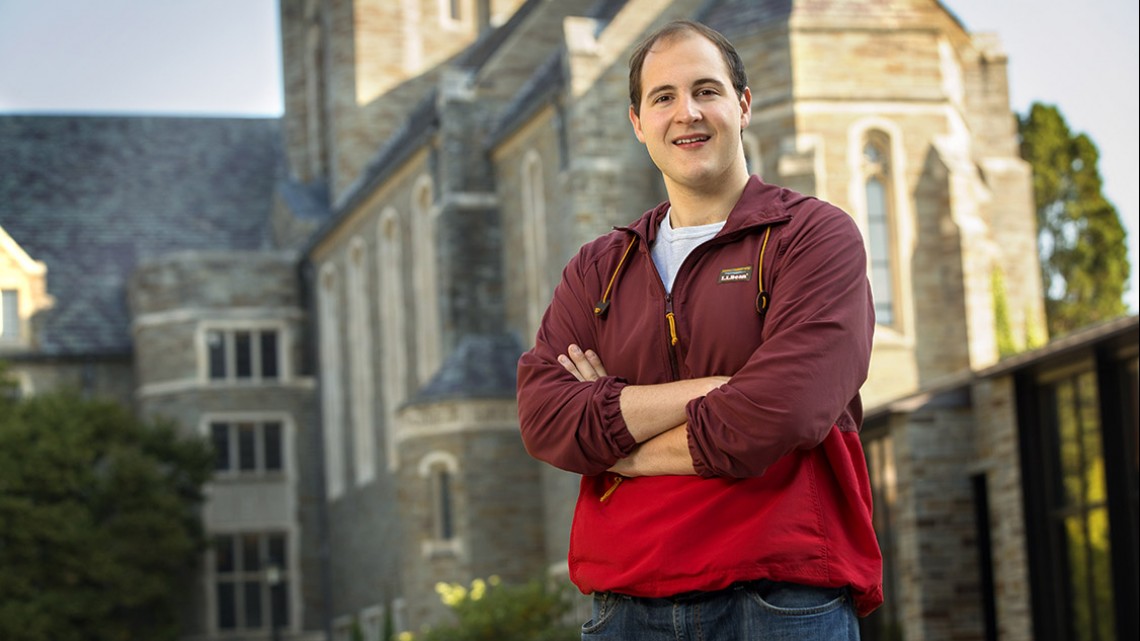
Adam Shelepak ’17 during a visit to campus in late summer.
Community engagement gives life more impact
By
I grew up in Endwell, New York, a small town about 40 miles from Cornell University. Though it’s a short drive from Ithaca, to me it represented a tremendous shift in worldview. My freshman year exposed me to thoughts, cultures and people that were not present during my first 18 years of life.
Seeking more exposure and more varied encounters drove much of my decision-making and community engagement over the next four years. My undergraduate experiences helping to launch a campus-based grocery store to improve food security, publishing public health research, and exploring the business world in New York City can all be traced to this idea.
I find that I often search for unifying factors to identify my passions: leveraging data insights to drive conclusions, searching for deeper meaning, and translating these insights into solutions.
Ultimately, I have found that work needs a purpose to have an impact.
I was raised with a deep sense of community. I have spent all of my life in central New York, and this connection did not waver in the bubble of Cornell’s campus.
Community engagement is an enriching framework for society. As young adults leading busy lives, we sometimes tend to overlook its importance. This is true at Cornell as well – even though I am sure that nearly every student engaged with his or her own community prior to coming to Ithaca. Cornellians are so engaged with studies, job searches and exams that we can forget we are also members of the Ithaca community. I was no exception to this tendency, but I made a concerted effort to leave campus and gain more exposure to the community around us.
As I settled into my college experience, I became involved in the nonprofit, Greek and social entrepreneurship communities at Cornell, which tended to spill into the surrounding town and city. I participated in many volunteer experiences through my chapter and the broader Greek community.
I also chaired the Cornell Student United Way campaign and helped United Way of Tompkins County coordinate some of its on-campus efforts to improve the health, education and financial stability of Tompkins County residents.
My most important experience at Cornell was serving as a co-director of Anabel’s Grocery, founded by Matthew Stefanko ’16 and Emma Johnston ’16 when they learned that many students were skipping meals due to financial constraints. Anabel’s provides access to healthy food at lower prices to students (along with a subsidy for those who need it most) and increases food literacy. I was involved from the very early stages, collaborating with food distributors and local organizations involved in countywide food systems.
Along with a team of incredibly talented people, I helped operate the student-run store through its launch in May 2017. This entrepreneurial experience taught me much about engagement with a community; the project truly shaped my Cornell experience. The work has blossomed into experiential learning opportunities in related academic courses. The store, a project of the Center for Transformative Action, is located in Anabel Taylor Hall.
I will continue these passions and commitment to community as a proud Cornell alumnus. The vibrancy and diversity of the Ithaca community is all around us, and I will always encourage Cornell students to engage with those around them, on campus and off. Sustained community engagement will make the world a more whole and caring place.
Adam Shelepak ’17 graduated from the College of Human Ecology in May and has completed some graduate studies with the Sloan Program in Health Administration. He received the 2017 Cornell University Relations’ Campus-Community Leadership Award and plans to start his career in management consulting.
This essay originally appeared in the fall 2017 issue of Ezra magazine.
Media Contact
Get Cornell news delivered right to your inbox.
Subscribe